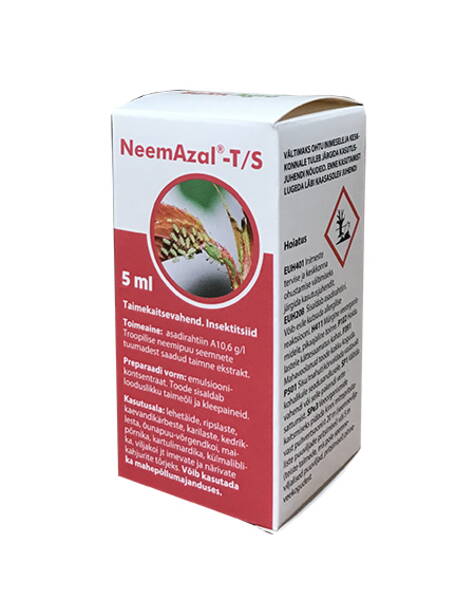Ex Tax: 25.95€
Biological insecticide based on the Azadirachta indica shrub.
Active ingredient: Azadirachtone (10 g/l).
Pros:
* an environmentally friendly product of natural origin, which can be safely used not only for organic farming, but also indoors.
* does not inhibit beneficial phytophagous fighters.
Cons: the drug is effective only in the primary stage of pest infestation.
Preparation of solution for spraying:
NeemAzal-T/S is usually used in the form of a 0.3–0.5% aqueous solution at a rate of 1.5–3.0 l/ha (30–50 ml per 10 l of spray solution).
The maximum concentration of the spray solution is 0.3 ml of NeemAzal-T/S per 1 m², which corresponds to 60–100 ml/1 m² of spray solution.
Typically, from 300 to 1000 liters of solution are sprayed per hectare.
To achieve the desired effect, it is necessary to evenly cover the entire plant with the solution.
If it rains within 8 hours after spraying, spraying must be repeated.
Dissolution rates in water: 3-5 ml/1l; 15-25 ml/5l; 30-50 ml 10 l.
The sprayer tank is filled with the required amount of water and NeemAzal-T/S is added with constant stirring. The prepared solution is used on the day of its preparation.
* Interesting information about the donor plant of such a useful natural insecticide:
Neem (Azadirachta indica) is one of the most famous medicinal plants in India. Hindus in ancient times called it "village pharmacy"...
And now, thousands of years later, the Indian lilac (Neem) is again becoming an “agricultural celebrity”: modern Western medicine has finally “discovered” a fact that was known to the ancient Hindus thousands of years ago - the Neem tree has remarkable pharmaceutical and pesticide properties!
Its effectiveness, availability and safety simply forced business agronomists to think about specially growing forests of Neem trees.
Azadirachthon contained in Neem is recognized as an effective biologically selective insecticide that does not harm beneficial insects and protects plants from 250 species of pests.
In addition to azadirachtone, Azadirachta indica also contains solanine, a chemical that is a powerful pesticide, much more effective than the synthetically created diethyltoluamide, which is found in most artificial pesticides.
Margosa, the oil obtained from its seeds, contains palmitic and stearic acids, as well as nimbosterol and tannin. The combination of these complex organic compounds provides the human body with a rejuvenating effect. Neem is also known to be used for heart disease, high blood pressure and arthritis. It contains components that lower cholesterol and clear arteries of fat cells.
Neem's medical secrets have now come under the microscope of Western doctors: German and American researchers are carefully studying its healing and rejuvenating properties. And they have already come to the conclusion: the substances contained in it can effectively treat a whole bunch of diseases, and at the same time not cause side effects characteristic of most “miracle” remedies that are filled with modern pharmacies...
In addition, the US National Science Council said that neem is "the most promising of all medicinal plants, ushering in a new era of pesticides, and could also provide millions of people with inexpensive medicines and even fight global warming."
It's funny that the pesticide properties of the Neem tree, which have now captured the imagination of many people, were discovered quite by accident: in 1959, the German agronomist Heinrich Schumterer, working on a scientific project in Sudan, noticed that a cloud of locusts that had flown into one of the farms covered all the plants – with the exception of Neem. Therefore, Dr. Schumterer immediately began a thorough study, the results of which literally shocked the scientific world, since he was able to discover that azadirachton, a complex component of Neem, is intolerable to more than 250 species of harmful insects, and also slows down the hatching process of larvae and caterpillars, thereby thereby significantly reducing the pest population!
Neem's great advantage is that this hardy, frost-resistant plant takes root well even in infertile soil. Moreover, it does not require a large amount of nutrients - thus this tree does not harm other crops, but on the contrary: neem has a unique property - it enriches the soil and increases its ability to retain water, since it contains substances that neutralize the acidity of the soil.
Agronomists claim that Neem is the most environmentally friendly pesticide that nature has given to man. And to use it as a pesticide, they recommend mixing Neem and its fruit grains with compost and letting it sit for two to six months before using it.











